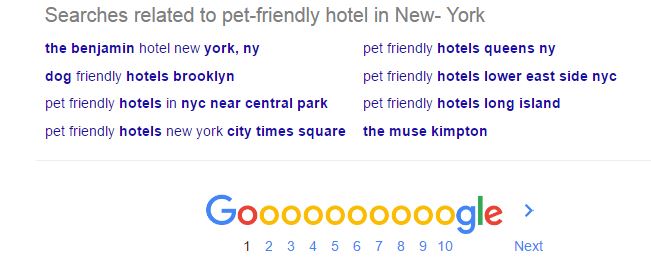How to reach your potential guests using optimized long tail keywords? Long-tail keywords are longer and more specific keyword phrases that visitors are more likely to use when they’re closer to a point-of-purchase. As the hospitality Industry is highly competitive, using long-tail keyword variations in your marketing campaigns can bring you better search rankings, more qualified search traffic, and lower costs per click. They open up a better way to connect with your customers.
For the hoteliers and vacation rentals, increasing their search engine ranking is very important. For this, they need to know what the traveler are likely to search for when they look to book up a hotel or vacation rental. And those results should be included while optimizing their website, blogs, contents etc to get listed top in the search result. The advantage of using long tail keyword is that it lets you customize your content based on highly specific and often niche search engine queries, which will often yield more positive results. The more specific you are the more you’re likely to get hits from the customer base that’s interested in your business.
How to find long tail keywords for your business ?
1) Related search queries
Related search queries is an ideal way that can help in finding long tail keywords. As you search in google the related searches appear in the text box as you are searching, or at the very bottom of the Google results page, next to the page numbers. This search query gives you other ideas that you can look down for a more specific but potentially rarer search engine query.


2) Unique services and benefits you offer
You can optimize your website with specific amenities you provide such as Pet-Friendly, Seafront, Free Wifi etc. Examples are listed below
- pet-friendly hotel in New- York
- Paris Hotel with restaurant
- Seafront hotel in Brighton
- Hotel with free WiFi in Singapore
In this way, you can optimize your website with long tail keywords to get potential guests who are searching for these amenities. These, in turn, gives an overview to the guest about the services and amenities you provide in your hotel/vacation rental. You can use these long tail keywords to find the related searches and can optimize your website accordingly.
3) Google Analytics Tool
Google offers Keyword Planner Tool to find out the suggested keywords that you can use to optimize your website. Google Keyword Planner was made for Adword users, but it is the most popular Google tool for keyword research.
Sign into your Google Adwords account and enter your keyword in the first column and click on the ideas button. For example, let’s type ‘ pet-friendly hotel’
You will get the following results. It shows that this term has a search volume of 74,000 per month. Likewise, you will get related keyword ideas and also their monthly search volume and competition level to get ranked for those keywords. You can combine these ideas to find the right keyword for your business.
Certain examples of keyword research tool are listed below
- Google Webmaster Tools
https://www.google.com/webmasters/tools
Google Webmaster Tools is currently the most accurate way to see what keywords people are using to land on your website. The data is only available for 90 days, so be sure to back it up every few months or so. - KeywordTool.io
http://keywordtool.io
This tool is new for 2014 and provides up to 750 keyword suggestions from Google for free. You can also select from Google search engines from different countries. Additionally, you can search from YouTube, Bing, and the App Store as well as export data. - SEM Rush
http://www.semrush.com
SEM Rush is a competitor research tool that provides your competitor’s keywords and where they are ranking. The free version of the tool provides just a few keywords, but the paid version provides a lot more. Simply enter your competitor’s website (or your own) to see a list of keywords they are ranking for. - SEO Book Keyword List Generator
http://tools.seobook.com/keyword-list/generator.php
The SEO Book Keyword List Generator creates combinations from words and phrases, similar to Merge Words. - Moz Keyword Tool
http://moz.com/tools/keyword-difficulty
The Moz Keyword Difficulty tool is part of the Moz Pro Membership package starting at $99 / month.
4) Through competitor analysis
By doing competitor analysis you can determine which keywords your competitors are focusing . This can be done simply by looking at their website’s metadata. You will be able to determine those keywords that they are targeting in their source code. This helps you in improving your SEO and advertising campaign.
To Conclude:
The long tail keyword should be used as the focus keyword for a page same as what we do for other keywords. It should be included in the page title, the meta title, the meta description, the first hundred words of the page, and at least one subheading.
-Make sure not to add these keywords too often. Depending upon your content strength add the keywords a maximum of 3-5 times.
-Do not try to optimize a single page for more than one keyword you are focusing. Try to generate separate content for each long tail keyword you are focusing.
– Using Stop words in long tail keywords is accepted. For example, you can use “Hotel in California” and not “Hotel California”. This means try to avoid using keywords in an artificial way.
Blog from Vafion | A preferred hospitality technology partner. Follow us on Linkedin
You can also write us to info@vafion.com
Similar Posts:
- 8 secrets to effectively market your vacation rentals using keywords.
- 13 Tips & Queries to ensure your rental website makes google happy.
- Make your rentals standout! Display Visual and Engaging Videos with YouTube
- Earned Media Vs OTA Ranking?
- Managing multiple OTAs with Channel Manager
- Advantages of working with OTA Channels
- Travel technology : Learn the trends that can serve your business
- Congratulations, Kerala tourism on winning the travel Oscars!
- What Is Expedia Virtual Card And How To Use It – Everything You Need To Know
- Pricing terms everyone should know in vacation rental industry









